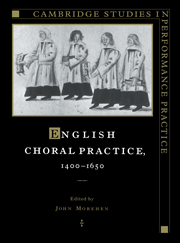Book contents
- Frontmatter
- Contents
- List of plates
- General preface
- Preface
- Abbreviations
- 1 To chorus from quartet: the performing resource for English church polyphony, c. 1390–1559
- 2 Editing and performing musica speculativa
- 3 The sound of Latin in England before and after the Reformation
- 4 English pronunciation, c. 1500 – c. 1625
- 5 Byrd, Tallis and Ferrabosco
- 6 John Baldwin and changing concepts of text underlay
- 7 Sacred songs in the chamber
- 8 The education of choristers in England during the sixteenth century
- 9 The ‘burden of proof’: the editor as detective
- Index of names and places
- Index of manuscript and printed music sources
- Index of works cited
9 - The ‘burden of proof’: the editor as detective
Published online by Cambridge University Press: 03 March 2010
- Frontmatter
- Contents
- List of plates
- General preface
- Preface
- Abbreviations
- 1 To chorus from quartet: the performing resource for English church polyphony, c. 1390–1559
- 2 Editing and performing musica speculativa
- 3 The sound of Latin in England before and after the Reformation
- 4 English pronunciation, c. 1500 – c. 1625
- 5 Byrd, Tallis and Ferrabosco
- 6 John Baldwin and changing concepts of text underlay
- 7 Sacred songs in the chamber
- 8 The education of choristers in England during the sixteenth century
- 9 The ‘burden of proof’: the editor as detective
- Index of names and places
- Index of manuscript and printed music sources
- Index of works cited
Summary
Writing several years ago in conjunction with the launch of The Byrd Edition, Philip Brett wisely cautioned readers to bear in mind the theory of ‘the duplicity of duplicates’ advanced by the former Bodley s Librarian, Falconer Madan – a theory which established as good working practice the assumption that two copies of an edition were different unless they could be proven to be identical. In view of the ease with which a unique source of an early musical composition, be it manuscript or printed, can be assumed to be reliable, the astute editor might do well to extrapolate from this maxim by assuming any such source to be defective unless convinced of its accuracy.
The surviving sources of English sacred music of the period c. 1550 – c. 1640 are, almost without exception, both unreliable as to musical and textual detail and uninformative as to performing practice. No collections of liturgical music were published in England between 1565 and 1641, a period delimited by Day's somewhat wayward Certaine notes set forth infoure and three parts and John Barnard's no less defective First Book of Selected Church Musick, which contained only music by composers who were no longer living. So far as manuscript sources are concerned, most are of provincial provenance and demonstrably embody a high degree of corruption, while of the autograph manuscripts few contain music by front-rank composers. Not a note of autograph church music survives by composers such as Thomas Tallis, William Byrd, Orlando Gibbons, Thomas Weelkes or Thomas Tomkins, for instance, although autograph sources are plentiful for second-flight composers such as Robert Ramsey, John Amner, Henry Loosemore, and a host of less accomplished musicians.
- Type
- Chapter
- Information
- English Choral Practice, 1400–1650 , pp. 200 - 220Publisher: Cambridge University PressPrint publication year: 1996
- 1
- Cited by



